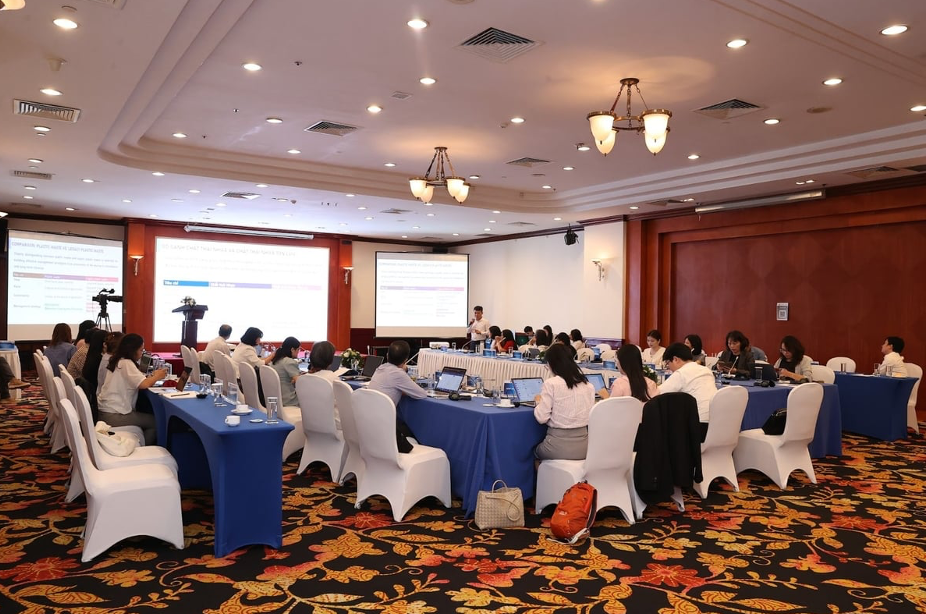3 key messages for Vietnam in preparing for the Post-INC-5.2 Phase
A representative from UNDP shared three key messages to guide Vietnam’s preparations for the post-negotiation phase of the Global Plastics Agreement (INC-5.2)
On October 21, the Ministry of Agriculture and Environment, in collaboration with the United Nations Development Programme (UNDP) in Vietnam through the Vietnam National Plastic Action Partnership (NPAP), organized a workshop titled “Vietnam’s Position in the Post-INC-5.2 Process of the Global Plastics Agreement” in Hanoi.
Within the framework of the workshop, participants discussed diverse perspectives to help Vietnam identify strategic priorities after INC-5.2 and prepare for future negotiation sessions.
At the INC-5.2 session held from August 5-15, 2025, in Geneva (Switzerland), countries had yet to reach consensus on several key issues, including the scope of plastic products to be regulated, support mechanisms, and the level of legal binding. Although a final agreement has not been achieved, all parties reaffirmed their commitment to continued dialogue toward a strong Global Plastics Agreement capable of ending plastic pollution and protecting ecosystems and public health.

This outcome has further strengthened Vietnam’s determination to act in parallel with the global process - by improving its plastic management policies, promoting reuse, reducing emissions, and advancing the transition toward a circular production and consumption model.
To prepare for the post-INC-5.2 phase, Mr. Vu Thai Truong, Assistant Resident Representative and Head of Climate Change, Environment and Energy at UNDP Vietnam, shared three strategic messages for Vietnam.
First, Vietnam needs to strengthen national coordination and translate commitments into concrete actions. The leadership and coordination role of the Ministry of Agriculture and Environment have fostered openness, transparency, and substantive engagement throughout Vietnam’s consultation process. Once the Global Plastics Agreement is adopted, a clear National Implementation Plan with well-defined targets and a transparent Measurement, Reporting, and Verification (MRV) system will be essential to mobilize international resources and ensure accountability.
Second, Vietnam should promote policy reform and business transformation. The Global Plastics Agreement presents both challenges and opportunities for the country’s plastics industry. Regulations on reducing virgin plastic use, increasing recycling, and ensuring transparency along the value chain will drive technological innovation, circular packaging design, and improved environmental governance.
Third, ensure sustainable financing - the driving force of transformation. The Global Plastics Agreement aims to establish a stable, transparent, and equitable financial mechanism based on the “polluter pays” principle. This mechanism will mobilize contributions from businesses, developed countries, and international funds to support activities such as reducing virgin plastic use, collecting and recycling plastics, and managing residual plastic waste.
Representing Vietnam’s negotiation delegation at INC-5.2, Ms. Vu Thuy Dung, Officer from the Department of International Cooperation under the Ministry of Agriculture and Environment, shared that Vietnam presented several key positions at the session.
First, Vietnam emphasized the principle of equitable cooperation, under which the Global Plastics Agreement should respect the differences in development levels among countries rather than applying a uniform model to all.
Second, Vietnam supported the establishment of shared responsibilities but stressed the need for flexibility for countries at different stages of development - a view that received strong support from many developing nations.
Third, the agreement should include a transparent, robust, and accessible financial mechanism to support the transformation of the plastics sector in developing countries, thereby ensuring effective and inclusive implementation.
Fourth, Vietnam backed a legally binding agreement but called for fairness and flexibility to reflect the disparities in capacity and development among nations.
“INC-5.2 still faces deep divisions; therefore, the negotiation process will continue for some time. Vietnam, along with other countries, needs to further prepare before the next round of negotiations is scheduled,” Ms. Vu Thuy Dung noted.
Minh Hanh